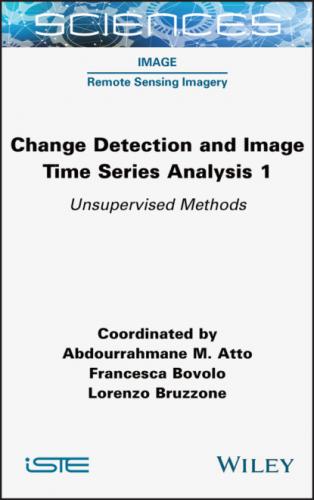255 251
256 252
257 253
258 254
259 255
260 256
261 257
262 258
263 259
264 260
265 261
266 262
267 263
268 264
269 265
270 266
271 267
272 268
273 269
274 270
275 271
276 272
277 273
278 274
279 275
280 276
281 277
282 278
283 279
284 281
285 282
286 283
287 284
288 285
SCIENCES
Image, Field Director – Laure Blanc-Feraud
Remote Sensing Imagery, Subject Heads – Emmanuel Trouvé and Avik Bhattacharya
Change Detection and Image Time Series Analysis 1
Unsupervised Methods
Coordinated by
Abdourrahmane M. Atto
Francesca Bovolo
Lorenzo Bruzzone
First published 2021 in Great Britain and the United States by ISTE Ltd and John Wiley & Sons, Inc.
Apart from any fair dealing for the purposes of research or private study, or criticism or review, as permitted under the Copyright, Designs and Patents Act 1988, this publication may only be reproduced, stored or transmitted, in any form or by any means, with the prior permission in writing of the publishers, or in the case of reprographic reproduction in accordance with the terms and licenses issued by the CLA. Enquiries concerning reproduction outside these terms should be sent to the publishers at the undermentioned address:
ISTE Ltd
27-37 St George’s Road
London SW19 4EU
UK
John Wiley & Sons, Inc.
111 River Street
Hoboken, NJ 07030
USA
© ISTE Ltd 2021
The rights of Abdourrahmane M. Atto, Francesca Bovolo and Lorenzo Bruzzone to be identified as the authors of this work have been asserted by them in accordance with the Copyright, Designs and Patents Act 1988.
Library of Congress Control Number: 2021941648
British Library Cataloguing-in-Publication Data
A CIP record for this book is available from the British Library
ISBN 978-1-78945-056-9
ERC code:
PE1 Mathematics
PE1_18 Scientific computing and data processing
PE10 Earth System Science
PE10_3 Climatology and climate change
PE10_4 Terrestrial ecology, land cover change
PE10_14 Earth observations from space/remote sensing
Preface
Abdourrahmane M. ATTO1, Francesca BOVOLO2 and Lorenzo BRUZZONE3
1University Savoie Mont Blanc, Annecy, France
2Fondazione Bruno Kessler, Trento, Italy
3University of Trento, Italy
This book is part of the ISTE-Wiley “SCIENCES” Encyclopedia and belongs to the Image field of the Engineering and Systems department. The Image field covers the entire processing chain from acquisition to interpretation by analyzing the data provided by various imaging systems. This field is split into seven subjects, including Remote Sensing Imagery (RSI). The heads of this subject are Emmanuel Trouvé and Avik Bhattacharya. In this subject, we propose a series of books that portray diverse and comprehensive topics in advanced remote-sensing images and their application for Earth Observation (EO). There has been an increasing demand for monitoring and predicting our planet’s evolution on a local, regional and global scale. Hence, over the past few decades, airborne, space-borne and ground-based platforms with active and passive sensors acquire images that measure several features at various spatial and temporal resolutions.
RSI has become a broad multidisciplinary domain attracting scientists across the diverse fields of science and engineering. The aim of the books proposed in this RSI series is to present the state-of-the-art and available scientific knowledge about the primary sources of images acquired by optical and radar sensors. The books cover the processing methods developed by the signal and image processing community to extract useful information for end-users for an extensive range of EO applications in natural resources.
In this project, each RSI book focuses on general topics such as change detection, surface displacement measurement, target detection, model inversion and data assimilation. This first book of the RSI series is dedicated to Change Detection and Image Time Series Analysis. It presents methods developed to detect changes and analyze their temporal evolutions using optical and/or synthetic aperture radar (SAR) images in diverse settings (e.g. image pairs, image time series). According to the numerous works and applications in this domain, this book is divided into two volumes, dedicated to unsupervised and supervised approaches, respectively. Unsupervised methods require little to no expert-based information to resolve a problem, whereas the contrary holds true, especially for methods that are supervised in the sense of providing a wide amount of labeled training data to the method, before testing this method.
Volume 1: Unsupervised methods
A
